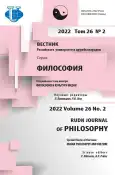Buddhist Ethics in Treatises of Post-Canonical Abhidharma
- Authors: Ostrovskaya H.P.1
-
Affiliations:
- Institute of Oriental Manuscripts RAS
- Issue: Vol 26, No 2 (2022): INDIAN PHILOSOPHY AND CULTURE
- Pages: 325-341
- Section: INDIAN PHILOSOPHY AND CULTURE
- URL: https://journal-vniispk.ru/2313-2302/article/view/325326
- DOI: https://doi.org/10.22363/2313-2302-2022-26-2-325-341
- ID: 325326
Cite item
Full Text
Abstract
The aim of the article is to define the tendencies of elaboration of ethical problems in early medieval exegetical texts - treatises of post-canonical Abhidharma. Ethics as a specific philosophical discipline concerning morals was not specifically developed because of cosmological character of Buddhist philosophy. Explication of the ethical discourse presented in treatises of eminent early medieval Indian Buddhist exegetics Vasubandhu (4-5 cc.), Asaṅga (4 c.) and Yaśomitra (8 c.) showed that specific for ethics questions on the highest good, sense of human life, the nature and sources of morals, freedom of will etc. were solved in post-canonical period. According to the religious doctrine they interpreted the highest good as the benefit of liberation ( mokṣabhāgīya ) from the fetches of suffering. The Buddha’s moral instructions known as prātimokṣa is aimed at the attainment of the highest good. Therefore the essence of morality has nothing to do with saṃsāra, and human society forming and perishing in cosmic cycles cannot be the source of moral norms. According to historiosophical myth, human beings get the first instructions on righteous behavior in deep antiquity from charismatic Universal ruler ( cakravartin ) coming to the world as the forerunner of the Buddha. He explains ontological contrariness of the good and the evil but is not the Teacher of the truth. Freedom of will cannot manifest itself spontaneously in a human being attached affectively to saṃsāra. Such an individual falsely takes his ignorant self-will for the freedom of will. Hearing the sermons of salvific teaching is the condition for the rising of free will impulse.
About the authors
Helena Petrovna Ostrovskaya
Institute of Oriental Manuscripts RAS
Author for correspondence.
Email: ost-alex@yandex.ru
Dr. Sci. (Philosophy), Professor, Researcher-in-Chief, Head of the South Asian Section of the Department of Central and South Asian studies 18, Dvortsovaya emb., St. Petersburg, 191186, Russian Federation
References
- Lysenko VG. F.I. Shcherbatskoi i О.О. Rozenberg o sravnitel’nom metode v buddologii: Dvoinoi portret na fone epokhi. Trudy “Russkoi antropologicheskoi shkoly”. Vol. 4 (part 2). Moscow: RSUH publ.; 2007. P. 100—138. (In Russian).
- Popova IF, editor. Russian expeditions to Central Asia in the end of XIX—early XX cent. St. Petersburg: Slaviia publ.; 2008. (In Russian).
- Vorobiova-Desiatovskaia МI. Sanskritskaia Tripitaka v svete paleograficheskikh issledovanii 1920-kh — 2000-kh godov. In V Eastern studies readings named after O.O. Rozenberg: Conference proceedings. Institute of Oriental Manuscripts, RAS. St. Petersburg: Izdatel’stvo A. Goloda publ.; 2012. P. 78—96. (In Russian).
- Dhammajoti Bhikkhu KL. Adhimukti and Subjectivity in Cognitive Experience: the Abhidharma and Yogācāra Perspective. Voprosy Filosofii. 2018;(7):131—139. (In Russian).
- Vasubandhu. Entsiklopediia Abhidharmy [Abhidharmakosha]. Parts III, IV. Ostrovskaya EP, Rudoj VI, translators, editors, authors of commentary and introduction. Moscow: Ladomir, 2001. (In Russian).
- Bayer A. The Theory of Karman in the Abhidharmasamuccaya. SPhB MS XXVI. Tokyo: The International Institute for Buddhist Studies; 2010.
- Pradhan P, editor. Abhidharmakošabhāùya of Vasubandhu. Tibetan Sanskrit works series. Vol. VIII. Patna: K.P. Jayaswal Research Institute; 1967.
- Wogihara U, editor. Sphuṭārthā Abhidharmakošavyākhyā by Yašomitra. Tokyo : The Publishing Association of Ahbidharmakošavyākhyā; 1932—1936.
- Kritzer R. Vasubandhu and the Yogācārabhūmi: Yogācāra Elements in the Abhidharmakoša. Tokyo: International Institute for Buddhist Studies; 2005.
- Dhammajoti Bhikkhu KL. Sarvāstivāda Abhidharma. Hong Kong: Centre of Buddhist Studies, University of Hong Kong; 2009.
- Pradhan P, editor. Abhidharmasamuccaya of Asanga. Santiniketan: Višva-Bharati; 1950. (Višva-Bharati Studies, 12).
- Vasubandhu. Entsiklopediia Abhidharmy [Abhidharmakosha]. Parts V, VI. St. Petersburg: SPbU publ.; 2006. (In Russian).
Supplementary files









